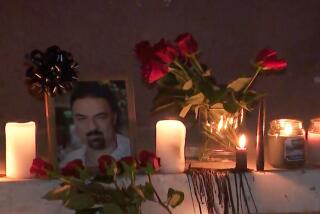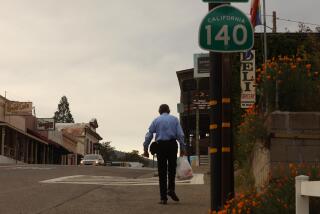‘USC sees our campus as a continuing-care situation in which every variety of situation exists.’--John M. Pavlik, executive director, Motion Picture & Television Country House and Hospital : USC, Hospital Join in Study of Old Age
- Share via
A group of Woodland Hills retirees will soon have new jobs--as unpaid participants in university research aimed at determining the relationship between old age and poor health.
Officials of the Motion Picture & Television Country House and Hospital said Thursday that researchers from the University of Southern California’s School of Medicine will contrast the effects of aging on healthy and ailing residents of the Woodland Hills facility.
Physicians from the medical school’s division of geriatric medicine will hunt for chemical changes in the elderly that lead to brittle bones, diabetes and such neurological disorders as strokes, Parkinson’s disease and Alzheimer’s disease, said Dr. Timothy M. Lefevre, medical director of the hospital.
The research work will be financed in part by a $40,000 medical fellowship from the hospital. USC will assign physicians enrolled in postgraduate geriatrics studies to work at the hospital.
Financed by the film and television industry, the 45-year-old retirement home and hospital is open to actors, cameramen, directors, technicians and others who have worked in the entertainment field.
Average Age Is 82
About 125 retirees, whose average age is 82, live in cottages and lodges on the 20-acre site at the intersection of Calabasas Road and Mulholland Drive. Another 170 residents are hospitalized there.
“USC sees our campus as a continuing-care situation in which every variety of situation exists,” said John M. Pavlik, executive director of the country house.
“They’ll be taking note of perfectly healthy older adults as well as those with ongoing chronic problems. They won’t be restricted to aging problems one finds in a convalescent hospital.”
Pavlik said the joint research program is scheduled to be formally announced tonight at a film screening and reception that is expected to draw 350 people to the Directors Guild of America headquarters in Hollywood.
He said the country house’s affiliation with USC will begin immediately, although the research fellowship will not be put to use until late this year or next.
Dr. Loren G. Lipson, an associate professor of medicine and gerontology and chief of the division of geriatric medicine at the USC School of Medicine, said the Woodland Hills program will begin with observation work.
Any drug treatments under the program will be voluntary on the part of the home’s residents, he said.
“We can have groups of healthy individuals and see how aging affects them in comparison with those with illnesses. Here’s a chance for us to learn about disease processes and sort out what is disease from what is the normal aging process.”
Lipson said aging studies are already being done through USC’s Andrus Gerontology Center, although “it is not always easy to find truly well people. It’s the sick people who come to us.”
He said the university-hospital linkup was suggested by Lefevre. USC agreed to participate after learning that the hospital had begun an innovative treatment program of its own for Alzheimer’s disease last year.
That project centers on an unusual, $150,000 enclosed garden used by Alzheimer’s patients. “I’ve never seen anything like it,” Lipson said.
Garden for Alzheimer’s Patients
The “wanderer’s garden” is designed to provide familiar experiences to Alzheimer’s patients. It includes an aviary, a fish pond, a front porch-like setting and chest-high planters that contain flowers patients can pick.
Descriptive signs such as “birds” and “tree” are used to remind patients of familiar objects whose names they have forgotten, according to hospital officials.
Inside an adjoining, 10-bed Alzheimer’s ward, patients’ pictures are placed outside their rooms and other pictures illustrate the functions of such areas as dining rooms, Lefevre said.
Patients picked for the Woodland Hills Alzheimer’s unit since its opening last summer have shown “clear improvement in their ability to handle routine daily requirements,” he said.
“We’re trying to avoid medical treatment because it tends to cause other problems,” Lefevre said.
Lefevre said he hopes that the university tie-in will place the four-doctor medical staff of the motion picture home’s hospital “on the cutting edge” of geriatric care.
“They’ll use our Alzheimer’s facility. And we’ll use their information,” Lefevre said.
More to Read
Sign up for Essential California
The most important California stories and recommendations in your inbox every morning.
You may occasionally receive promotional content from the Los Angeles Times.














